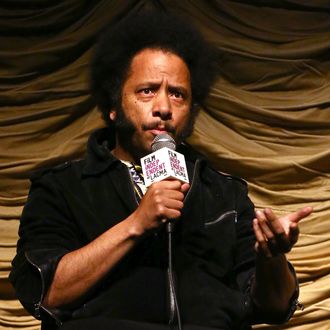
As it turns out, Sorry to Bother You director Boots Riley has something that’s really, really bothering him. In a series of tweets posted Friday, Riley took director Spike Lee, and Lee’s new drama BlacKkKlansman, to tasks for fudging historical truths in order to, in Riley’s opinion, make the police seem unilaterally anti-racist in a historical way. His critique, as you might expect, contains many spoilers for BlacKkKlansman, so consider yourself warned.
Central to Riley’s criticism of the film is its advertisement as being a “true story.” While the movie is based on African-American police officer Ron Stallworth’s 2014 memoir Black Klansman, depicting his real-life experience infiltrating the KKK in Colorado Springs, Colorado, Riley argues that inaccuracies added to the film all seem to serve the same purpose. “It’s a made up story in which the false parts of it to try to make a cop the protagonist in the fight against racist oppression,” the director says in part.
The alleged discrepancies Riley takes issue with include the downplaying of Stallworth’s three-year stint infiltrating black radical organizations (as opposed to the one meeting depicted in the film), a bombing, an incident in which cops take a fellow officer to task for admitting to racist police brutality and the depiction of Stallworth’s partner Flip Zimmerman (played by Adam Driver) as Jewish. Stallworth never identified his fellow officer in his book, referring to him as “Chuck,” and so his ethnicity is not known.
Combined with the historically antagonistic relationship between law enforcement and black radical organizations, Riley argues, BlacKkKlansman ultimately paints a too-rosy cinematic picture. “Look-we deal with racism not just from physical terror or attitudes of racist people, but in pay scale, housing, health care, and other material quality of life issues,” the director writes. “But to the extent that people of color deal with actual physical attacks and terrorizing due to racism and racist doctrines, we deal with it mostly from the police on a day to day basis. And not just from white cops. From black cops, too.”
While one could argue that a film based on a police officer’s memoir would invariably depict the police as heroic, Riley further indicts Lee, or more specifically Lee’s advertising company, for accepting $200,000 to consult on a new public awareness campaign for the New York Police Department, reportedly designed to reach out to minority communities.
Lee has been a vocal critic of the NYPD and police brutality in the past. However, the film’s narrative changes and Lee’s financial relationship to police, in Riley’s mind, feel too close for comfort. Writes the director, “Whether it actually is or not, BlacKkKlansman feels like an extension of that ad campaign.”




